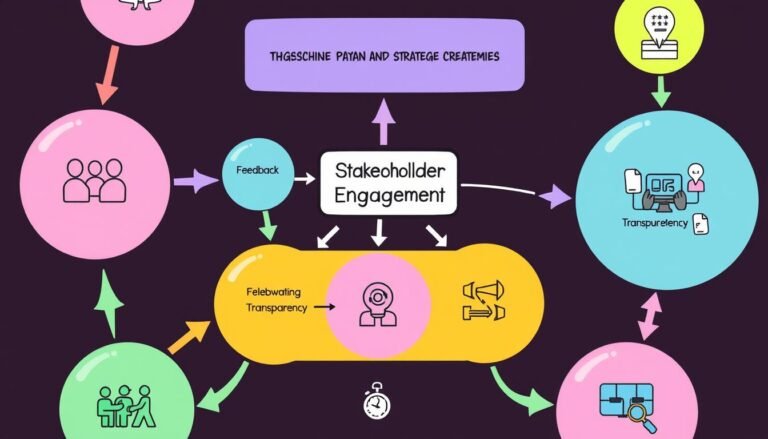Crisis Management and Leadership
“The ultimate measure of a man is not where he stands in moments of comfort and convenience, but where he stands at times of challenge and controversy.” – Martin Luther King Jr.
In tough times, true leaders show their strength. Crisis management and leadership are crucial for any organization. The COVID-19 pandemic showed us how important quick thinking and adaptability are.
Great leaders in emergencies know how to handle the unexpected. They understand their actions can either help or harm. As the pandemic grew, the ability to adjust and keep businesses running became essential.
Good crisis management is about planning and action. It’s not just knowing the facts; it’s about leading and guiding your team. This way, leaders can be experts and still guide their teams through hard times.
Key Takeaways
- Clear communication is crucial during crises
- Adaptability is a key trait for effective crisis leadership
- Empathy and proactive problem-solving are essential skills
- Crisis plans should be flexible and adaptable
- Calm leadership fosters team confidence in emergencies
- Balancing expertise with strategic vision is vital
Understanding the Fundamentals of Crisis Management and Leadership
Crisis management and leadership are key in today’s fast world. Leaders must be ready to handle unexpected challenges. They guide their teams through tough times.
Defining Crisis in Modern Organizations
A crisis can happen anytime, disrupting normal work and threatening stability. In today’s VUCA world, leaders face many challenges. Good crisis communication is vital for managing these situations.
The Role of Leadership During Emergencies
Leaders are crucial in emergencies. They quickly assess situations, create plans, and adjust as needed. Being open and clear is key to keeping everyone’s trust.
Impact of Effective Crisis Management on Business Continuity
Good crisis management helps keep businesses running. By planning well and acting fast, companies can bounce back quickly. Leaders who focus on people and make smart decisions help their teams through tough times.
“Clarity is crucial in crisis situations.” – Gallup Organization
To improve your crisis management skills, check out our detailed course:
- Course fee: $400.00
- Duration: 4 hours
- CEUs: 0.4
- 6 modules with live online classes
- Available for 365 days after enrollment
Invest in your leadership skills today to tackle tomorrow’s challenges. Call 1.800.217.1390 for more information.
Critical Leadership Qualities in Crisis Situations
Leadership shines when times are tough. Good crisis team management needs special skills. Leaders must make smart decisions quickly to keep their teams stable and growing.
Regina Phelps, a top crisis management expert, lists seven key skills for leaders:
- Situational awareness
- Improvisation
- Creativity & adaptability
- Decisiveness
- Action
- Communication
- Reevaluation
These skills help leaders deal with different types of crises. They must always be ready, with plans for unexpected problems.
Good communication is key in crisis leadership. Leaders should use social media and other channels to keep everyone informed. This builds trust and helps avoid bad outcomes.
“Decisiveness is the bedrock of effective crisis management. Leaders must make tough calls with limited information to keep their teams moving forward.”
Emotional intelligence is also crucial. Leaders who understand emotions can keep their teams motivated. With these skills and smart strategies, leaders can not only handle crises but also come out stronger.
Building Effective Crisis Communication Frameworks
In today’s fast-paced business world, having a solid crisis communication framework is vital. Organizations need to be ready for anything, from natural disasters to public relations nightmares. Let’s explore how to build a framework that works.
Establishing Clear Communication Channels
When crisis strikes, clear channels are key. Set up a system where information flows smoothly. This might mean using a mix of emails, texts, and face-to-face meetings. The goal? Everyone knows what’s happening and what to do next.
Managing Stakeholder Communications
Stakeholder engagement is crucial during emergencies. Keep everyone in the loop – employees, customers, and partners. Be honest and open. Share updates regularly. This builds trust and keeps rumors at bay.
Internal Communication Best Practices
Don’t forget your team! Good internal communication keeps morale high during tough times. Here are some tips:
- Hold regular briefings
- Encourage two-way communication
- Address concerns head-on
- Use a consistent tone across all messages
Remember, your emergency response plan should include these communication strategies. They’re not just nice-to-haves – they’re must-haves for weathering any storm.
“Organizations that share authentic, transparent, and consistent messages during a crisis are more likely to gain trust, maintain brand perception, and retain loyal customers, employees, and partners.”
By focusing on clear channels, stakeholder engagement, and strong internal practices, you’ll build a crisis communication framework that stands up to any challenge.
Developing Strategic Response Plans
Creating strong strategic response plans is key for good crisis management. These plans help an organization deal with unexpected problems and keep business running smoothly.
Risk Assessment and Prevention Strategies
Risk assessment is the first step in making a strategic response plan. It means finding out what threats your industry might face. For instance, tech companies might worry about cyber attacks, while marketing firms might worry about bad publicity.
After finding out the risks, you can start preventing crises before they happen. This is a big part of keeping your business safe.
Emergency Response Protocols
Emergency response protocols tell you what to do in a crisis. They should have a clear plan, how to communicate, and steps for different situations. A 2019 PwC survey found that companies with good emergency plans did better in crises.
Resource Allocation During Crisis
It’s important to use resources well during a crisis. This means focusing on the most important tasks, who does what, and using what you have wisely. A crisis team helps make these decisions fast and right.
Using AI to predict problems can make your plan even better. It can spot threats early, so you can act fast. It’s also important to keep your plan up to date and test it often.
“Between 40% and 60% of small businesses never reopen their doors following a disaster.” – Federal Emergency Management Agency (FEMA)
This fact shows how vital good strategic response plans are. They help keep your business going and make it stronger over time.
Leading with Empathy and Emotional Intelligence
In times of crisis, leaders show their strength through empathy and emotional intelligence (EI). These skills help build a solid base for managing teams and engaging stakeholders. Research shows that nearly 90% of top performers have high EI. This skill is key for handling tough talks and keeping team spirits high.
EI is vital in crisis management. Leaders with high EI can improve communication by 23%. This makes it easier to talk openly during stressful times. This skill is especially important in fields like healthcare, education, and customer service.
Empathy in leadership boosts job performance. Teams led by empathetic leaders see 80% higher job satisfaction and productivity. In crises, this means:
- 40% lower turnover rates
- 60% increase in employee trust and loyalty
- Improved ability to turn challenges into growth opportunities
Self-awareness, a key EI component, helps leaders manage their emotions during stress. This skill, combined with social awareness, lets leaders understand their team members’ unique experiences. It helps unite teams effectively.
“Empathy is the most important skill you can practice. It will lead to greater success personally and professionally and will allow you to become happier the more you practice.”
| EI Component | Impact on Crisis Management |
|---|---|
| Self-awareness | Constructive emotion management |
| Social awareness | Understanding employee experiences |
| Relationship management | Building rapport and inspiring others |
Creating and Managing Crisis Response Teams
Effective crisis team management is key for organizations to handle tough situations. A well-organized crisis response team can be the difference between success and failure. This is especially true when facing unexpected challenges.
Team Structure and Roles
A crisis response team should have members from important departments. These include Communications, Legal, Risk Management, Finance, Human Resources, and Supply Chain. Each member brings their own expertise to tackle different parts of a crisis.
It’s important to choose team members who can perform well under pressure. Leadership resilience is crucial in picking effective crisis response leaders. This is more important than just looking at seniority or political considerations.
Decision-Making Frameworks
Having clear decision-making frameworks is vital for crisis management. These frameworks help the team make quick and effective decisions during high-pressure situations. Regular training and simulations help team members understand their roles and practice making decisions under pressure.
Team Coordination Strategies
Effective coordination is key for crisis response teams. Strategies include:
- Clear communication protocols
- Regular team meetings
- Use of collaborative tools
- Defined escalation procedures
These strategies help the team work together effectively. They also make sure information is shared well among team members. This leads to more comprehensive and effective crisis management.
| Crisis Type | Impact | Management Strategy |
|---|---|---|
| Financial | Revenue loss, market position decline | Implement financial contingency plans |
| Technological | Website crashes, data breaches | Develop robust backup systems |
| Natural | Business disruption | Create disaster recovery plans |
Adapting to Post-Crisis Changes
After a crisis, things change a lot. It’s time for deep thinking and planning. Leaders must plan for recovery to keep the business going. They aim to come out stronger and more resilient.
Learning from Crisis Experiences
Crisis moments teach us a lot. Leaders should look at what worked and what didn’t. This knowledge helps in making better plans for the future.
Implementing Organizational Changes
Changes are needed based on what we learned. This could mean new policies, team structures, or tech. The goal is to keep the company’s values and goals in mind.
- Update crisis response protocols
- Enhance communication systems
- Invest in employee training
Building Long-term Resilience
Leadership is key for lasting success. Leaders should create a culture that learns and adapts. This way, teams are ready for anything that comes their way.
“The most effective teams are those that adapt their working styles to different situations.” – Amy Edmondson, Harvard Business School
By focusing on these areas, organizations can grow from crisis moments. This forward-thinking ensures they’re ready for whatever comes next.
Conclusion
Crisis management and leadership are key in today’s fast-changing business world. Leaders must be ready to lead their teams through tough times. They need to have confidence and clear plans.
Having strong crisis response plans, open communication, and resilient teams is crucial. This way, companies can face any challenge head-on.
Good crisis leadership is more than just fixing problems. It’s about being ready for risks, making fast decisions, and caring for all stakeholders. Learning from each crisis is essential for success.
Organizations that focus on crisis management training and planning are best prepared. They can handle unexpected problems better.
Crisis management is a continuous effort of getting ready, responding, and recovering. By improving their crisis leadership, managers can turn disasters into chances for growth. It’s not just about surviving; it’s about coming out stronger and more resilient.
Source Links
- Why it’s important to know how to lead through a crisis
- Why crisis leadership isn’t the same as crisis management (It’s way more)
- BSI Training – Fundamentals of Crisis Management
- Crisis Leadership: 10 Guiding Principles – TEPSA
- 5 Fundamentals of Effective Crisis Leadership
- 7 Crisis management skills for effective response to critical events – Everbridge
- 6 leadership skills to develop for crisis management
- How to Craft Your Crisis Management Framework
- Role of Strategic Communication in Crisis Management and Business Continuity
- Steps to Build an Effective Crisis Management Team
- Step-by-Step Guide to Creating a Crisis Management Plan
- What is a Crisis Management Plan? (6 Steps) [2024] • Asana
- Creating a Successful Crisis Management Plan
- Leading with Emotional Intelligence in a Crisis
- The Crucial Role of Emotional Intelligence and Empathy in Modern Leadership
- How Empathy Can Shape Effective Communication"
- 8 Steps to Creating a Competent Crisis Management Team – crisisconferences.com
- How to Set Up a Crisis Response Team (and Why You Need One) | MHA Consutling
- Crisis Management Team: Function, Roles & Responsibilities
- A Leader’s Guide To Navigating Through Crisis
- Leadership in Crisis Management: Navigating the Storm with Confidence and Clarity
- Change Management in Times of Crisis: Adapting IT & Business Operations for Resilience
- Crisis Management in Leadership: Transforming Challenges into Opportunities.
- Crisis Leadership Skills: Guide to Managing Tough Times








